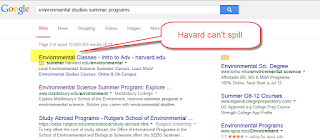I love AdWords! I hate AdWords! It's all about the details. Meaning
Oh, and as a Harvard Alum - shout out to Harvard. Do you SPELL CHECK your ads? You gotta kinda sortta look intelligent on your ads. See screenshot of currently running Harvard ad.
A guy walks up to the "8 items or less" aisle at a store in Cambridge, MA, with 25 items. The clerk asks, "Are you from Harvard and can't count, or from MIT and can't read?"
- Do you know your keywords? Really know your keywords: which ones are "transactional," which ones are "converters," which ones are "dogs?"
- Do you write strong ads that ATTRACT customers and REPEL non-customers?
- Do you have a strong landing page that leads to a CONVERSION?
Spell Check Your Ads
Oh, and as a Harvard Alum - shout out to Harvard. Do you SPELL CHECK your ads? You gotta kinda sortta look intelligent on your ads. See screenshot of currently running Harvard ad.
A guy walks up to the "8 items or less" aisle at a store in Cambridge, MA, with 25 items. The clerk asks, "Are you from Harvard and can't count, or from MIT and can't read?"
 |
| Click to see Full Image |
Comments
Post a Comment